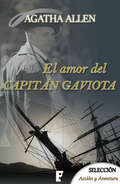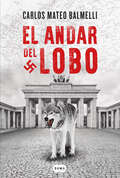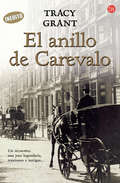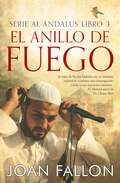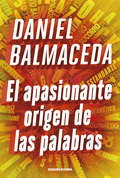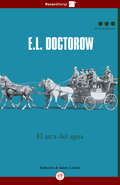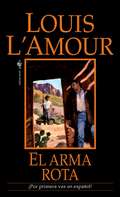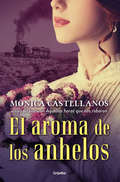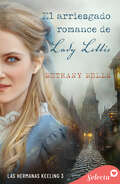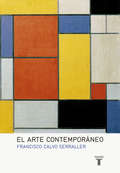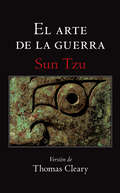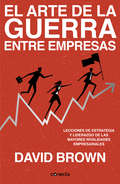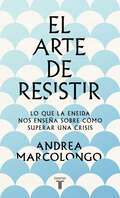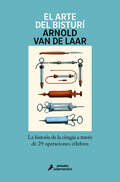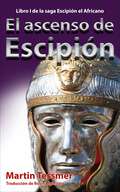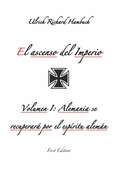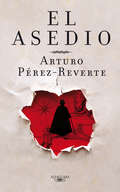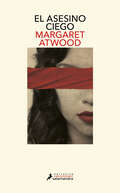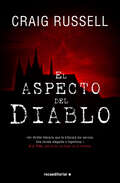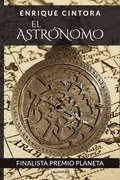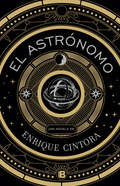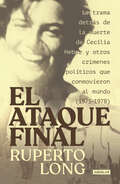- Table View
- List View
El amor de Anna
by Fabiola ArellanoDe Inglaterra a la salvaje América. Una mujer rota que tendrá que vencer numerosos obstáculos para volver a ser feliz. Para Anna, huérfana de madre desde muy temprana edad, el sentirse querida y parte de su propia familia, parece tan imposible como encontrar la olla de oro al final del arcoíris. Recluida por su madrastra en un exclusivo internado para señoritas, Anna tiene que soportar los constantes ataques de su prima Lineth y los brutales castigos impuestos por miss Steel. Es en medio de todo ese caos cuando conoce a ese chico de oscura mirada que, con su voz profunda, logra sacarla de las terribles pesadillas que martirizan sus noches. Vendida a un depravado y traicionada por su madrastra, Anna se ve obligada a tomar medidas desesperadas, sin embargo, escapar de la mano fiera de la mujer que la cambió por unas monedas no es tarea fácil. Sin más, Anna se ve secuestrada en un barco rumbo a América. Sola y a merced de un hombre que bien podría ser su abuelo, la joven tendrá que sacar fuerzas si quiere salir bien librada de un matrimonio impuesto y recuperar a su único y verdadero amor. Por desgracia para ella, los obstáculos no son solo materiales o circunstanciales. El principal reto a vencer son las innumerables cerraduras con las que su ángel ha guardado el corazón.
El amor del capitán Gaviota
by Agatha AllenNovela romántica de aventuras y acción con fondo histórico inspirada en la vida de Jordi Farragut. Juan Gaviota es un joven menorquín nacido en 1755 en Ciutadella, en el seno de una familia de pescadores. Para salvar a su hermana de una violación, Juan mata a un letrado francés, hecho que le empuja a huir y a convertir su vida en un azar que le llevará, después de ser cautivo en un barco pirata bereber, a estudiar náutica en Barcelona y a servir en la armada inglesa del Mediterráneo. Gran navegante, Juan Gaviota atravesará el Atlántico y se enrolará en el ejército norteamericano en la guerra de independencia de las colonias, y, posteriormente,en las luchas contra los indios. En Menorca, sin embargo, Juan ha dejado a su amor, Águeda, una muchacha casada por la fuerza con Felipe de Gaula, terrateniente con plantaciones en Carolina del Sur. En tierras americanas los amantes luchan para reencontrarse cuando los Gaula se trasladan a Charles Town. En esta novela inspirada en la vida de Jordi Farragut, padre del primer almirante de los Estados Unidos, David Glasgow Farragut, el autor se ha tomado licencias y ha recreado la figura del héroe menorquín, nunca estudiada con suficiente atención, hasta convertirla en un arquetipo de la lucha por el amor y la libertad.
El andar del lobo
by Carlos Mateo BalmelliA partir del manuscrito de un ex jerarca de las SS, el temible grupo parapolicial del nazismo, un publicista se propone desentrañar la mente de un hombre común, apasionado por la historia y la filosofía, que abrazó al partido político de Adolf Hitler y refleja su pensamiento sobre la Segunda Guerra Mundial y el Holocausto. Luego de aquellos sucesos, de los que no se arrepiente y justifica, termina su vida en Paraguay dedicado a la docencia. Dice Francisco Pérez de Antón que «El andar del lobo es la dramática biografía de Wolfgang, un nazi sin apellido, y de su viaje vital al corazón de las tinieblas. Desde su adolescencia en la Alemania hitleriana hasta su refugio y muerte en Asunción del Paraguay, Wolfgang hallará la justificación de su vida y de sus crímenes en el viejo aforismo latino, según el cual el hombre es un lobo para el hombre. El genocidio nazi, asegura, no fue tan diferente a otras matanzas parecidas de la Segunda Guerra Mundial. La razón histórica absuelve al viejo lobo de todo juicio moral hasta el día en que, ya en el otoño de su vida, sucumbe a los dictados del amor, una emoción a su juicio incapaz de servir a una causa superior como la suya. Utilizando el panegírico ideológico y la apología del crimen como recursos para provocar el rechazo, Carlos Mateo Balmelli escribió una deslumbrante reflexión sobre la violencia y el mal, siempre latentes en el corazón humano. Un libro para leer y releer, una obra densa y profunda de un maestro de la prosa».
El angel perdido: Una novela (Atria Espanol)
by Javier SierraMientras trabaja en la restauración del Pórtico de la Gloria de Santiago de Compostela, Julia Álvarez recibe una noticia devastadora: su marido ha sido secuestrado en una región montañosa del noreste de Turquía. Sin quererlo, Julia se verá envuelta en una ambiciosa carrera por controlar dos antiguas piedras que, al parecer, permiten el contacto con entidades sobrenaturales y por las que están interesados desde una misteriosa secta oriental hasta el presidente de los Estados Unidos.Javier Sierra nos sumerge en un mundo en el que historia, magia, tecnologías ancestrales y ciencia de vanguardia se aúnan en un thriller tan evocador y documentado como original. Una obra que deja atrás todos los convencionalismos del género, reinventándolo y empujando al lector a una aventura que no olvidará.
El anillo de Carevalo
by Tracy GrantUn secuestro, una joya legendaria, traiciones e intrigas... Londres, 1819. Colin, el hijo del matrimonio formado por Charles, un prominente político, y Mélanie Fraser, es secuestrado para conseguir a cambio el anillo de Carevalo, una antigua y valiosa joya que según cuenta la leyenda le otorga el poder a quien la posea. Para Charles y Mélanie comienza así una desesperada carrera contrarreloj para recuperar el anillo que una vez tuvieron en sus manos, y con él a su hijo. Pero la tarea es difícil y está llena de trampas, intentos de asesinato, mentiras y revelaciones sorprendentes que amenazan con destruir la relación de la pareja. Reseñas:«Si Jane Austen y Len Deighton hubieran trabajado juntos, les habría salido algo muy parecido a la original y fascinante obra de Tracy Grant.»Chicago Tribune «Un libro emocionante y conmovedor, no lo podrá abandonar.»The Romance Reader
El anillo de fuego
by Joan FallonEs 1008AD, en Córdoba, la capital del califato de al-Ándalus. Cuando comienza nuestra historia, Almanzor lleva seis años muerto y al-Hisham II, el califa y legítimo gobernante de al-Ándalus, sigue viviendo una vida aislada en el palacio de Medina Azahara. El país ahora está gobernado por el hijo mayor de Almanzor, Abd al-Malik, pero no es el hombre que fue su padre y pronto hay amenazas a su supremacía. Mientras las facciones rivales luchan por tomar el control de la ciudad, el futuro es incierto para al-Hisham y la dinastía omeya. El califa acude a su amigo de la infancia, Ahmad, en busca de ayuda, pero Ahmad es un cetrero, no un soldado, y su prioridad es mantener a su familia a salvo. Cuando la ciudad es sitiada, y parece que no hay escapatoria para ellos, encuentra ayuda de una fuente inesperada. Ahora debe elegir entre salvar a al-Hisham y arriesgar la seguridad de su familia o cumplir su promesa.
El apasionante origen de las palabras
by Daniel BalmacedaEn este nuevo libro Daniel Balmaceda aumenta su colección sobre el origen de las palabras. Con términos novedosos y que hacen al contexto en el que vivimos (como deadline, free-lance o target), hasta el origen de la palabra "cuarentena" que tanto utilizamos en este año. Sin embargo, no deja de lado ciertas frases que utilizamos en la Argentina, como "Quedar en Pampa y la vía", o los maravillosos epónimos, un género en sí mismos. Daniel Balmaceda vuelve a fascinarnos con la historia de las palabras, desde las que empezaron a formar parte de nuestro vocabulario en los últimos tiempos (como deadline, free-lance, target) hasta frases que usamos sin saber muy bien qué significan ("Quedar en Pampa y la vía"). En el recorrido, nos descubre secretos de la historia universal y de sus curiosos personajes. El apasionante origen de las palabras actualiza las más divertidas anécdotas de Historia de las palabras e Historias de letras, palabras y frases con novedosas definiciones. Como dice el autor, la palabra es una herramienta poderosa y admirable. Indagar en su historia es sumergirnos en nuestra propia historia. Y nadie mejor que Daniel Balmaceda para guiarnos en esta travesía.
El arca del agua
by E. L. Doctorow Julieta LionettiEstamos en la Nueva York de después de la Guerra Civil estadounidense, con sus calles llenas de veteranos tullidos, vendedores de periódicos, mendigos, floristas, donde los policías corruptos del intendente Tweed todo lo dominan para su propio beneficio y una clase social de nuevos ricos e intelecto débil que está surgiendo, brillante, en este escenario de miseria colectiva.Martin Pemberton camina por Broadway una mañana lluviosa y ve pasar de refilón un carruaje con pasajeros vestidos de negro. Entre ellos reconoce a su padre, el mismo que ha muerto recientemente y a cuyo entierro Martin ha asistido. Se desvía de su camino para seguir este extraño carruaje, metiéndose de lleno en una ciudad fantasmal que se opone a Nueva York como si fuera el negativo de una fotografía panorámica, con luces y sombras al contrario de como deberían ser.El señor McIlvaine, el editor del periódico y cronista de las múltiples capas que componen la ciudad, se encuentra atrapado por el misterio que la historia de Martin supone y por el hecho de que el mismo Martin acabe desapareciendo.Nueva York, su agua corriente; el gas que llega a sus farolas; sus trenes y telégrafos; sus imprentas que escupen miles de periódicos . . . Todo ello la convierte en una ciudad moderna y dinámica sin concesiones. Sin embargo, lo que McIlvaine descubre tras el misterio Pemberton se oculta en el reino de las sombras de lo antiguo, de los impulsos primarios y de las transgresiones paganas . . .
El arma rota: Una novela
by Louis L'AmourHace noventa años, los hermanos Toomey, en compañía de otros 25 hombres y cuatro mil cabezas de ganado, se esfumaron camino a Arizona. Cuando es escritor e historiador Dan Sheridan es invitado al rancho de los hermanos desaparecidos por su actual dueño, no deja escapar la oportunidad. La visita concuerda de maravilla con su plan de aclarar ese misterio de cien años de antigüedad - pero el hecho es que su anfitrión no es amante de los libros, de los escritores ni de quienes no se limitan a ocuparse de sus propios asuntos. Muy pronto, Dan se encuentra viviendo en carne propia los peligros del Viejo Oeste - perseguido por territorio indómito por varios matones salidos de las páginas más violentas de sus historias. Sin embargo, sus enemigos han cometido un grave error: Sheridan no es cualquier escritor de pacotilla y matarlo no será tan fácil como piensan.From the Paperback edition.
El aroma de los anhelos
by Mónica CastellanosEl aroma de los anhelos es una historia de amor, pero también un gran retrato del México precursor al estallido de la Revolución mexicana. Durante el porfiriato crece cada vez más el descontento de la población. Distintos grupos comienzan a organizarse para confrontar al presidente, entre ellos, el bando liderado por Francisco I. Madero. Los maderistas se situarán en distintos lugares de México y al sur de Estados Unidos, específicamente en San Antonio, Texas, punto clave para la lucha. María, de tan sólo 15 años, es una joven con espíritu revolucionario que desea escapar de su condición social privilegiada para promover el voto femenino, participar en la política e iniciar una vida de entrega para los más necesitados. Las lecturas como Regeneración de los Flores Magón, Punto Rojo del poeta Práxedis G. Guerrero y Los miserables de Victor Hugo, le infundirán ese valor. Pero no será tarea fácil: la protección y las costumbres de su madre, aunadas a las restricciones de su género, la enfrentarán a diferentes obstáculos. Sin embargo, el destino dará un vuelco cuando conoce a un joven doctor recién llegado a San Antonio, Daniel Chapman. Pronto, él se convertirá en confidente y amigo, ya que un poderoso lazo los unirá más allá de lo terrenal.
El arriesgado romance de lady Lettie (Las hermanas Keeling #Volumen 3)
by Bethany BellsHace años que la alta sociedad de Londres relaciona los nombres de lady Lettie y lord Glèdhorcha. Pero ¿hasta qué punto se sabe lo que está ocurriendo entre ellos? Lady Letizia Keeling es más inteligente y menos buena de lo que piensan todos cuantos la quieren. Sabe lo que desea de la vida, y siempre ha ido a por ello, como cuando tuvo un admirador durante cosa de un año, solo por atormentar a su hermano, el duque de Gysforth.Pero ya lleva tiempo relacionada con lord Glèdhorcha. Tras unos inicios difíciles, en los que llegó a dudar de si el joven conde la cortejaba a ella o a su hermana gemela, las cosas avanzaron rápido. Todo hubiera sido perfecto de no ser porque lord Glèdhorcha es el heredero de uno de los hombres más peligrosos del imperio, enemigo directo de su hermano, el duque de Gysforth, y que lleva ya un tiempo bajo la atenta vigilancia del rey.Lord Sloan Puscat, el atractivo marqués de Glèdhorcha, podría ser un hombre envidiado en cualquier lugar o época. Primogénito y heredero del poderoso duque de Dankworth, ha crecido como un privilegiado y tiene poder y fortuna. Además, ha encontrado el amor, sin duda alguna, porque pudo reconocerla desde el primer momento, nada más verla, pese a tener la joven una hermana gemela. Sin embargo, su padre es un traidor. Nadie lo sabe mejor que él, porque hace tiempo que quiere atraerlo a una sociedad secreta llamada La Estirpe, en la que se supone que ostentaría uno de los puestos más importantes. Sloan no tiene claro todavía qué busca La Estirpe, pero sí que cuanto hace, es traición a la Corona. Solo espera poder solucionar ese asunto, antes de que se produzca un cisma en pleno corazón del imperio británico, y no estar poniendo la vida de Lettie en peligro, por tenerla a su lado.¿Habrá un futuro para ellos, en un mundo en el que no importen las intrigas, si no, simplemente, su amor?
El arte contemporáneo
by Francisco Calvo SerrallerDescubre cuáles han sido los principales cambios y movimientos del arte contemporáneo desde su nacimiento, en el siglo XVIII, hasta las últimas tendenciasLa pregunta más repetida en relación con el arte de nuestra época es fruto de la perplejidad: ¿qué significa? Pues su principal y revolucionaria característica es el rechazo a la tradición. ¿Cuál es, entonces, el fundamento de ese arte que ya no busca imitar selectivamente la realidad para plasmar su belleza? La respuesta es la libertad. El ejercicio de ésta implica no aceptar determinación dogmática ni canon preestablecido alguno. Esto explica por qué, todavía hoy, se discute no el valor de una obra, sino qué es el arte. Como el resto de los valores de nuestra época, se rige por el tiempo, cuyo fundamento es el cambio. Probablemente nunca llegaremos a una formulación definitiva acerca del significado del arte, pero ello no nos priva de la experiencia y, por lo tanto, del saber derivado de la historia de esa aventura.En esta obra, Francisco Calvo Serraller analiza cuáles han sido los principales cambios y movimientos del arte contemporáneo desde su nacimiento, en el siglo XVIII, hasta las últimas tendencias. Esta nueva edición, para la que el autor ha escrito un «Epílogo a modo de prólogo» y que está profusamente ilustrada, aportará a los conocedores una síntesis clara de arquitectura, pintura, escultura, fotografía y cine, que permitirá ordenar conceptos, y a los profanos una clave para acercarse a este apasionante tema.
El arte de amar tus secretos (Minstrel Valley #Volumen 25)
by Bethany BellsArtista y musa, caballero y doncella; ella no quiere permitirse sentir y él no concibe una vida sin amarla por completo, incluidos sus secretos. Lucy Campbell trabaja desde hace años como doncella en la Escuela de Señoritas de lady Acton. Es fría, reservada y, en opinión de la mayoría, ambiciosa. Siempre ha confiado en que su gran belleza le abriría las puertas a un buen matrimonio, pero pasa el tiempo, va cumpliendo años y se le acaban las oportunidades. Entre las alumnas, es la doncella a la que todas quieren recurrir en sus salidas, pero no por su simpatía, sino porque Lucy acepta pequeñas sumas de dinero a cambio de dejar que se vayan solas a hacer sus travesuras, en vez de acompañarlas a todas partes, como es su deber. Gerald Perkins IV es el heredero de una larga estirpe de ricos abogados, lo que, teniendo en cuenta que él quiere ser pintor, ha condicionado negativamente su vida. Presionado por su abuelo para que siente la cabeza, se case y se dedique de una vez al mundo legal, ha decidido esconderse una temporada en algún sitio, donde creará la obra maestra que le abrirá las puertas de la fama. Elige Minstrel Valley porque su buen amigo Marcus Hale, marqués de Northcott se lo recomienda, y se presenta allí bajo la falsa identidad de un pintor con pocos recursos que trata de abrirse camino como puede en la vida. Lucy y Gerald se conocen y se sienten atraídos el uno por el otro, pero ambos piensan que no se convienen. ¿Podrá el amor plasmarse sobre el lienzo de sus vidas, antes de que uno de ellos cometa un error irreversible?
El arte de la guerra (Clásicos Ilustrados Ser. #Vol. 1)
by Sun Tzu Thomas ClearyRecopilado más de dos mil años atrás por un misterioso guerrero filósofo, El arte de la guerra sigue siendo, quizás, hoy en día, el libro de estrategia más prestigioso e influyente del mundo, estudiado en Asia por políticos modernos y ejecutivos con el mismo entusiasmo con el que fuera consultado en tiempos antiguos por jefes militares. Como estudio de la anatomía de las organizaciones en conflicto, El arte de la guerra se aplica en general a la competencia y al conflicto, en todo nivel, desde el interpersonal al internacional. Su objetivo es la invencibilidad, la victoria sin dar batalla, y la fuerza inexpugnable gracias a la comprensión de la física, la política y la psicología del conflicto. Compiled more than two thousand years ago by a mysterious warrior-philosopher, The Art of War is still perhaps the most prestigious and influential book of strategy in the world today, as eagerly studied in Asia by modern politicians and executives as it has been by military leaders since ancient times. As a study of the anatomy of organizations in conflict, The Art of War applies to competition and conflict in general, on every level from the interpersonal to the international. Its aim is invincibility, victory without battle, and unassailable strength through understanding of the physics, politics, and psychology of conflict.
El arte de la guerra entre empresas: Lecciones de estrategia y liderazgo de las mayores rivalidades empresariales
by David BrownUn libro magnífico de intriga y estrategia empresarial que recoge algunas de las rivalidades entre empresas más apasionantes de la historia. Los negocios son una constante lucha por sobrevivir. En los negocios, como en la guerra, los líderes se enfrentan persiguiendo intereses contrapuestos, idean estrategias y consiguen recursos en pro de la victoria. El éxito depende del detalle más nimio; un error táctico puede derribar un imperio. Al final, un bando triunfa, y la victoria es lo único que importa. David Brown, presentador del popular pódcast Business Wars, reúne en este libro algunos de los más fascinantes enfrentamientos entre empresas y, en cada batalla que examina, pasa revista al ingenio, la estrategia y los recursos. Brown narra el ascenso de las empresas a medida que derrotan a sus rivales, formulan planes innovadores y se adaptan a las cambiantes necesidades de la sociedad. ¿El objetivo? Mantenerse por delante de la competencia y convertirse en titanes de la industria. Las historias de El arte de la guerra entre empresas son extraordinarias, pero las lecciones que el lector extraerá de ellas, sobre determinación, ingenio, paciencia, agallas, sutileza..., son incalculables, ya sea un emprendedor o el CEO de una compañía multinacional. «Cuanto más atrás puedas mirar, más adelante verás».WINSTON CHURCHILL Reseñas:«Si estás preocupado por un competidor conocido o un disruptor invisible, este libro reúne lo mejor de un pódcast de éxito para tu aprendizaje y disfrute».ADAM GRANT, autor de los best sellers Think Again y Originales «David Brown ha hecho un trabajo magistral al pasar por encima de balances e ingresos, y retratar lo realmente importante en una empresa: ego, pasión, ambición y combate cuerpo a cuerpo».JOE NOCERA, columnista de la sección de negocios de Bloomberg «Si Blockbuster hubiera aprendido el "arte de la guerra" de Business Wars, tal vez Netflix no los hubiera derrocado».RICH GREENFIELD, socio y analista de LightShed Ventures
El arte de resistir: Lo que la Eneida nos enseña sobre cómo superar una crisis
by Andrea MarcolongoAndrea Marcolongo vuelve a tender hilos entre el mundo clásico y el nuestro. «Andrea Marcolongo es la Montaigne del siglo XXI. Sabiduría y encanto a raudales».ANDRÉ ACIMAN La Eneida no es un poema para tiempos de paz. Sus versos no son apropiados cuando todo va sobre ruedas, son ideales cuando sentimos la urgencia de encontrar nuestro camino hacia un después que nos asombra por su diferencia con el antes en el que siempre hemos vivido. Por decirlo con otras palabras: la lectura de la Eneida es muy recomendable en medio del huracán, y a ser posible sin paraguas. Eneas es el hombre vencido, el héroe sin patria a la que volver. Se aleja de las ruinas de Troya con su padre a cuestas y en busca de un nuevo comienzo, armado con sus posesiones más preciadas, en un barco sin timonel a la búsqueda de una tierra prometida en la que volver a empezar.A su más puro estilo, Marcolongo nos muestra en este maravilloso ensayo cómo el poema épico de Virgilio resuena en el mundo contemporáneo y cómo sus temáticas y sus protagonistas nos pueden seguir emocionando aún hoy. De Eneas solemos recordar su huida de Troya o su trágica historia de amor con Dido, pero tendemos a olvidar el relato épico de los orígenes míticos de Roma y su imperio. Su resiliencia y la fuerza de su esperanza son ejemplares y constituyen una lección de sorprendente actualidad. La crítica ha dicho:«Marcolongo vuelve sobre aquello que mejor hace: leer el mundo con ojos nuevos y sabios».Karina Sainz «Según Marcolongo, en la Eneida reconocemos una esperanza que nos concierne a todos: la de encontrar un lugar donde podamos parar, dejar atrás el dolor y volver a empezar».Elle«Libro a libro, explorando las grandes obras de la Antigüedad, Marcolongo ha creado un estilo muy personal, que combina una erudición infalible con un enfoque sensible. Su nuevo ilumina La Eneida bajo una luz contemporánea».Le Monde «¡Qué gran libro para el futuro, que al mismo tiempo nos lleva a echar la vista atrás!».Tutto Libri, La Stampa«Una lección muy actual que todos en la escuela han estudiado e inmediatamente olvidado».La Repubblica
El arte del bisturí
by Arnold Van de LaarUn apasionante recorrido por la historia de la cirugía a través de 29 operaciones célebres. El cirujano Arnold van de Laar recurre a su propia experiencia y conocimientos para contarnos una incisiva historia del pasado, presente y futuro de la disciplina a través de 29 operaciones célebres. Desde el relato de cómo Albert Einstein se salvó de un aneurisma hasta la extracción de un cálculo renal que se practicó a sí mismo un herrero holandés en el siglo XVII o la operación a Juan Pablo II tras el atentado que sufrió en 1981, entre otros, Arnold van de Laar intenta dar respuesta a todo lo que sucede en el curso de una operación e indaga en los límites de la cirugía al hilo de los nuevos avances médicos. Una mirada amena, instructiva y estremecedora sobre los procedimientos y la filosofía de quienes cortan para curar. La crítica ha dicho...«Una historia con un toque quirúrgico: precisa, incisiva y a veces terriblemente sangrienta.»The Sunday Times «Absolutamente excepcional y fascinante.»Mail on Sunday «Un libro interesante y por momentos estremecedor que invita a los lectores a atisbar dentro de los reyes, en las almas de las estrellas de rock y en los canales auditivos de los astronautas.»The Daily Telegraph «Un libro lleno de sorprendentes relatos de incisiones y puntadas.»The Wall Street Journal «Vívidas descripciones de destacadas operaciones, desde los tiempos pasados hasta el presente. [...] Vertiginoso y lúcido.»Publishers Weekly «¿Los cirujanos están locos? ¿Son geniales o inmorales? ¿Héroes o fanfarrones? Van de Laar contesta que son todo eso y mucho más. El arte del bisturí es un libro muy divertido. Siéntense, relájense y disfruten de esta bulliciosa exploración del oficio de los cirujanos.»The Times
El ascenso de Escipión: Libro I de la saga Escipión el Africano (Escipión el Africano #1)
by Martin TessmerTres hombres, tres juramentos. Uno para proteger Roma, otro para destruirla y un tercero para que fracasen los dos anteriores. Ambientada en el año 200 a. C., El ascenso de Escipión es la historia de un niño apasionado por los libros que se transforma en un estratega e innovador militar sin igual, un general que los historiadores han denominado «más grande que Napoleón». Espoleado por un juramento de sangre a su padre, el joven Escipión renuncia a su entorno privilegiado para unirse a las legiones de Roma en la lucha contra el inmortal Aníbal el Grande, un general cartaginés que ha prometido conquistar Roma. Mientras se suceden diversas derrotas cruentas, el joven Escipión aprende el secreto para derrotar al inexpugnable imperio cartaginés. Entre tanto, Aníbal diezma las menguantes legiones de Roma. Mientras los dos Escipiones luchan contra los enemigos de Roma, un joven granjero estricto viaja a Roma jurando restituir el nombre de su familia y convertirse en su adalid. Bajo la tutela del despiadado senador Flaco, Catón el Viejo asciende en el escalafón político con el objetivo de destruir Cartago y librar a Roma del partido helenista de los Escipiones. Solo la madre de Escipión, la astuta Pomponia, puede impedir que Catón socave los esfuerzos desesperados de su hijo por anticiparse a Aníbal y a los implacables Tres Generales. El ascenso de Escipión es una historia real de sacrificio personal, ambición política, genio militar y compromiso inquebrantable. Acompaña a Escipión, Emilia, Laelio, Pomponia y Marco Sileno en su lucha contra las adversidades en una época en la que el destino de la civilización occidental pende de un hilo. Primer libro de la saga de Escipión.
El ascenso del Imperio: Alemania solo se recuperará con el espíritu alemán
by Ulrich Richard HambuchEl pueblo de poetas y pensadores, que en dos ocasiones ha sido víctima de terribles guerras mundiales en la historia reciente, se encuentra nuevamente en una profunda crisis en estos días y se encuentra en una encrucijada. En los últimos siete años, en este contexto se han producido innumerables obras, analíticamente brillantes, pero sobrias, extensas y para la mayoría incomprensibles y, por lo tanto, en última instancia, sólo fugaces, en las que los autores se sintieron llamados a descubrir y denunciar las cosas que, consciente o inconscientemente, se han producido. inconscientemente nos oprimió en las últimas décadas. Sin embargo, en última instancia, todos los autores que conocí no lograron esbozar una alternativa holística y sostenible al estado actual. Esto tenía que remediarse. Hoy lo considero una coincidencia del destino, que durante algunos años no me ha permitido desde muchos lados continuar mi actividad habitual de manera permanente y en toda su extensión y el destino me llevó a partir de ahora a dedicarme en reclusión e imparcialidad al tema de encontrando la verdad. Como persona que, después de un tiempo de aprender, pensar, sentir y hacer una pausa, es capaz de actuar, no pude encontrar un hogar en ninguna fiesta, empresa o lugar en la República Federal de Alemania. Así que decidí sin más preámbulos crear este hogar político, secular y espiritual ideal para mí.
El asedio
by Arturo Pérez-RevertePREMIO DAGGER DE NOVELA NEGRA ¿Puede ser una coincidencia que una muchacha muera a latigazos donde acaba de caer una bomba? ¿Puede jugarse una partida de ajedrez usando como escenario una ciudad sitiada? El asedio es la novela más enigmática de Arturo Pérez-Reverte Cádiz, 1811. España lucha por su independencia mientras América lo hace por la suya. En las calles de la ciudad más liberal de Europa se libran batallas de otra índole. Mujeres jóvenes aparecen desolladas a latigazos. En cada lugar, antes del hallazgo del cadáver, ha caído una bomba francesa. Eso traza sobre la ciudad un mapa superpuesto y siniestro: un complejo tablero de ajedrez donde la mano de un jugador oculto -un asesino despiadado, el azar, las curvas de artillería, la dirección de los vientos, el cálculo deprobabilidades- mueve piezas que deciden el destino de los protagonistas: un policía corrupto y brutal, la heredera de una importante casa comercial gaditana, un capitán corsario de pocos escrúpulos, un taxidermista misántropo y espía, un enternecedor guerrillero de las salinas y un excéntrico artillero a quien las guerras importan menos que resolver el problema técnico del corto alcance de sus obuses. El asedio narra el pulso asombroso de un mundo que pudo ser y no fue. El fin de una época y unos personajes condenados por la Historia, sentenciados a un vida que, como la ciudad que los alberga -una Cádiz equívoca, enigmática, solo en apariencia luminosa y blanca-, nunca volverá a ser la misma.
El asesino ciego
by Margaret AtwoodGalardonada con el Premio Booker, una narración que combinasuspense gótico, saga familiar y ciencia ficción 1945. Diez días después del final de la guerra, Laura Chase se tira por un puente y deja a Iris, su hermana mayor, un manuscrito titulado «El asesino ciego». Medio siglo más tarde, Iris reflexiona sobre su vida nada ejemplar, en particular sobre los acontecimientos que rodearon la trágica muerte de su hermana. El principal de ellos, la publicación de «El asesino ciego», una novela que le valió a Laura no sólo reconocimiento, sino también culto devoto, y que describe una arriesgada pasión amorosa en los años treinta entre una joven adinerada y un hombre que se ha dado a la fuga. A medida que el amor, el sacrificio y la traición complican la historia inventada y la real, los acontecimientos se precipitan hacia la catástrofe. La crítica ha dicho:«Brillante, opulenta, Margaret Atwood es tanto una gran poeta como una gran creadora de ficciones».John Updike, The New Yorker «Absorbente. Una narración ejecutada con maestría».The New York Times «La primera gran novela del nuevo milenio».Newsday«Una novela atrevida, rebosante de imaginación y brillantemente ejecutada».Kirkus Reviews «Escalofriante, lírica, una de las obras más ambiciosas de la autora».The Boston Globe «Margaret Atwood domina el arte de crear ficciones densas y complejas a partir de narraciones cuidadosamente estratificadas, haciendo uso de toda una serie de recursos literarios».The Guardian«Los secretos de familia, la rivalidad entre hermanos, las argucias políticas y el malestar social, las promesas y las traiciones son los temas de la nueva y brillante novela de Atwood. [...] En cuanto a la valentía narrativa, Atwood supera incluso a El cuento de la criada y Alias Grace».Publisher's Weekly
El aspecto del diablo
by Craig Russell¿Cómo atrapas a un asesino cuando estás rodeado de locura? 1935. Mientras Europa se prepara para una guerra funesta, seis homicidas dementes, conocidos como «Los Seis Demonios», se encuentran confinados en un manicomio en un castillo de una zona rural de Checoslovaquia. Cada uno de estos pacientes tiene su propia historia que contar, todas ellas tan oscuras como perturbadoras. Utilizando nuevas técnicas revolucionarias, el doctor Viktor Kosárek, un joven psiquiatra, tiene la misión de desentrañar los secretos de sus asesinatos.Al mismo tiempo, un asesino en serie apodado «Delantal de cuero» por los periódicos, va dejando un reguero de asesinatos por toda Praga. Eludiendo continuamente a sus perseguidores, todo parece indicar que estos perversos crímenes los hubiese cometido el mismo Diablo. ¿Cuáles son los nexos entre este terrible asesino y los presos dementes en el castillo de las Águilas?Solo el Diablo lo sabe. Y depende de Viktor hallar la verdad. Situada bajo la sombra de la oscuridad de los nazis que estalla al otro lado de la frontera de Checoslovaquia, El aspecto del diablo es una novela llena de imaginación y altamente adictiva. La crítica ha dicho...«Un thriller literario que te destrozará los nervios. Una novela elegante e ingeniosa.»A.J. Finn, autor de La mujer en la ventana «Un inteligente thriller ambientado en el asfixiante clima social de una Checoslovaquia a las puertas de la Segunda Guerra Mundial.»José Antonio Luna, eldiario.es«Una novela sensacional, protagonizada por un asesino en serie de época, en la que los giros son tan lógicos como sorprendentes. Una lectura ideal para los fans de El alienista de Caleb Carr y Thomas Harris.»Publishers Weekly «El novelista y expolicía escocés explora todas los rostros de maldad de la mano de Lukâs Smolák, su nuevo detective checo.»Miguel Lorenci, El Correo «Este escritor nos lleva adonde quiere. En sus intrigas criminales y por estas calles.»Lilian Neuman, Cultura|s, La Vanguardia «Un tour de force: un thriller inteligente y visceral cuyo final me ha maravillado. El misterioso trasfondo de una Checoslovaquia al borde de la II Guerra Mundial añade una capa más a la atmósfera de esta novela que se convertirá en una extraordinaria pesadilla para los lectores.»Lincoln Child «Intensa, oscura y retorcida. Craig Russell ha creado una obra maestra con este thriller.»Alex Grecian, autor best seller de The New York Times «Craig Russell es uno de los maestros de la novela negra. Con su nuevo trabajo viaja hasta Checoslovaquia de la mano del detective Lukâs Smolák, que se enfrenta a un asesino que imita al ya mítico Jack el Destripador.»Librújula
El astrónomo
by Enrique CintoraFinalista Premio Planeta Roy Arias, recién nacido, es encontrado entre las ruinas de Córdoba y adoptado por un caballero templario que lo entrega a la abadesa de un convento para que lo críe. Roy estudia en Salamanca y es admitido como aprendiz del astrónomo del rey Alfonso X, que les ordena ir a Persia en busca del sabio Nasir. En su viaje, junto con su maestro ben Fazzam, el fiel esclavo Batani y Manfred, capitán de la guardia del rey, se encontrarán con los mercaderes Polo, convivirán con tribus de las estepas, sufrirán emboscadas, conocerán el Imperio mongol e intimarán con mujeres extraordinarias. Una mezcla trepidante de aventuras, amor, intrigas nobiliarias, astrología, búsqueda de conocimientos y misterios.
El astrónomo
by Enrique CintoraGanador del Premio Caligrama Best-Seller 2019: una novela histórica que nos embarcará en una gran aventura en el siglo XIII. Salamanca, siglo XIII. Roy Arias es un joven huérfano de origen humilde apasionado por el saber y las ciencias en una de las épocas más luminosas del reino de Castilla y León. Entusiasmado por la astronomía, consigue convertirse en el aprendiz de uno de los astrónomos de confianza de Alfonso X. Movido por su notorio apetito de conocimiento, el rey encargará a Roy y a su maestro que viajen hasta el lejano oriente en busca de un famoso astrónomo. Será entonces cuando comience un viaje inolvidable plagado de conflictos, pasiones y asesinatos que le harán volver a la península convertido él mismo en un maestro astrónomo a la altura de los consejeros del rey. En Castilla y León, mientras la relación con los musulmanes ha empeorado y las batallas son cada vez más violentas, un amor prohibido vuelve del pasado del astrónomo. Castilla corre peligro y la vida de Roy Arias también. «Éramos los elegidos para defender la ciencia de las estrellas. Nadie lo haría sino nosotros, e iban en ello el saber y la verdad.»
El ataque final
by Ruperto LongEntre 1975 y 1978, en el marco de las dictaduras militares al sur del continente americano, una sucesión de feroces ataques contra políticos conmovieron al mundo. La muerte de Cecilia Fontana de Heber en un atentado con vino envenenado fue el atroz desenlace de aquel Uruguay oscuro. Ruperto Long, quien fuera testigo cercano de muchos de estos hechos, construye con pasión y con rigor una magnífica crónica novelada de aquella época terrible. Promediando la década de 1970, un gris Uruguay sobrevivía como podía en medio de una dictadura militar respaldada por el Plan Cóndor. Dentro de las filas castrenses, algunos veían con preocupación un posible final de aquel régimen que habían instalado por medio de la violencia. Por ello, el asesinato que estaban por pergeñar tenía por objetivo ganar tiempo, dilatar cualquier eventual apertura democrática e incidir en la implacable pugna por el poder que tenía lugar entre facciones militares. Ese fue el origen del crimen que pretendió aniquilar a los tres principales dirigentes del Partido Nacional uruguayo, y que terminó cegando la vida de Cecilia Fontana de Heber. El autor rescata al personaje de Cecil, esposa del dirigente Mario Heber y madre de cinco hijos, quien debió lidiar con la dura realidad que se colaba por las ventanas, sin sospechar que finalmente le golpearía las entrañas. Matilde, la esposa de Héctor Gutiérrez Ruiz, era su amiga querida, y sus maridos compañeros en la política. Por eso sus vidas se vieron atravesadas por los asesinatos del Toba y de Zelmar Michelini, las luchas y vicisitudes de Wilson, quien escapó milagrosamente de esa suerte (primero en Buenos Aires y luego en Londres), el crimen de Letelier y el eventual atentado a Edward Koch en Washington, y los entresijos de la CIA y la diplomacia. Una trama de intrigas y emociones que fueron la cruda verdad. «Eran tiempos azarosos y lo importante era mantener viva la llama [...]. No teníamos armas, y no nos interesaba tenerlas [...]. Nunca recuperaríamos la democracia mediante la violencia. Nuestra única fortaleza eran las ansias de libertad de la gente.»

